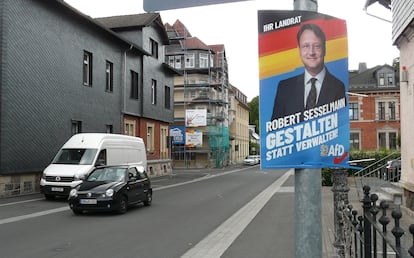Sonneberg, the eastern German city that embodies the rise of the extreme right
Disenchantment with politics, mistrust of immigration and fear about the economic crisis have all triggered support for the Alternative for Germany (AfD). In the regions that make up the what was once East Germany – excluding Berlin – the far-right party is leading the polls with 32% of the projected vote


Sonneberg is a small German city located at the foot of the Thuringian forest. Its 23,000 inhabitants walk through a pleasant center, which isn’t particularly pretty. It houses the German Toy Museum, which attracts some tourism to this municipality.
This nondescript city – once part of the German Democratic Republic (GDR), or East Germany – has recently found its way into the headlines of the Berlin press. This is because of some predictably anodyne elections in the regional district (of which Sonneberg is the capital), which have ended up rattling Germany’s national politics.
On June 11, Robert Sesselman – candidate of the far-right Alternative for Germany (AfD) to be the district administrator – took 47% of the vote. He ended up 10 points ahead of his rival from the conservative Christian Democratic Union (CDU), Jurgen Köpper. The results caused some surprise and much concern. Was Sonneberg going to have the dubious honor of being part of the first district – with 56,500 inhabitants in total – to be run by the extreme right in the entire country? With its quaint hundred-year-old town hall, the small city has placed itself at the center of a political earthquake – one that has caused the dizzying rise of the once-marginal AfD in recent weeks.
At the national level, the far-right party has climbed to reach second place in the polls, either tied with Chancellor Olaf Scholz’s Social Democratic Party, or surpassing it, depending on the polling firm in question. Never since its creation back in 2012 has it generated so much support – between 17% and 19% today, according to public opinion surveys. While this isn’t enough to take power on the national scale, what truly worries the rest of the parties is what’s happening in the eastern Länder – the five states of the former communist GDR that reunified with the Federal Republic of Germany in 1990. The Forsa Institute has carried out the exercise of polling which party East Germany (excluding Berlin) would vote for if elections were held today. According to surveys, the AfD would win them handily, with 32% of the vote.
“So much effort to promote tourism and now we’re going to be known as the city of the extreme right,” laments a municipal employee. Above all, one word is heard in the center of the town, near the also-popular Teddy Bear Museum: “discontent.” It’s the first thing that social worker Anja May, 54, mentions when asked why her neighbors have voted en masse for the AfD. “Money is scarce – they see that it’s not used for what it should be used for: education, nurseries, care for the elderly. People are fed up with [the government] and everything they’re doing wrong in Berlin,” she says. May is surprised, because it’s the second time in just a few days that a journalist has approached her on the street.
In Germany, political gatherings and analysis spaces in newspapers speak of nothing else: what’s happening in eastern Germany? Whose fault is it? Can anything be done before next year’s regional elections in Saxony, Thuringia and Brandenburg? It’s precisely in these three regions that the AfD is strongest, points out Franco Delle Donne, who holds a doctorate in Political Communications from the Free University of Berlin and has co-authored a book on the rise of the extreme right. “In addition, this year, there are local elections. That is, there’s a campaign going on – the AfD rhetoric is circulating.”
The far-right party – which is being monitored by German intelligence services for being suspected of threatening constitutional values – has entered a third phase. It started out as a eurosceptic movement in the heat of the financial meltdown, but then evolved into an anti-immigration party following the 2015 refugee crisis. With the pandemic, it tried to take advantage of the protests against the restrictions, but failed. Since then, Delle Donne notes, it’s become known as “a party that capitalizes on discontent.” Several factors are behind the AfD’s vote: disappointment with the government, fear of the negative effects of the war in Ukraine, the energy crisis and disenchantment with the other parties. In the east, moreover, surveys about satisfaction with democracy reveal significantly lower levels of enthusiasm than in the rest of the country.
“There’s a huge disappointment with politics in general… people don’t want to vote for the usual parties,” says Norbert Leipold-Beck, 72, in front of the city hall. A retired couple – who are CDU voters – take turns explaining that, right or wrong, their neighbors are fed up. “But if the AfD came to power, people would realize what they voted for and would regret it, I’m sure. I understand the frustration, but the AfD is too dangerous, too dangerous,” the couple repeats. They prefer not to give their names.
A young woman also wishes to remain anonymous – she’s the only resident of Sonneberg that EL PAÍS spoke with who admitted to voting for the extreme right. She’s 25-years-old and assures this newspaper that “there’s nothing for German citizens – you work and work and the end of the month comes and you have no money left. There are more and more foreigners. I have nothing against them, but our country gives them everything for free. You see them with new cell phones, new shoes… very chic, they go out to eat here and there.”
“Our land. Our rules.”
She’s sitting in front of a kebab restaurant, with her two-year-old son in the stroller, while she waits for a takeaway order to be served. On the street are AfD election posters, where a smiling Sesselman promises: “Our land. Our rules.” Almost all the restaurants in the center are run by residents of foreign descent. “I have nothing against them; they work and earn what they have,” she says, pointing to the boy, of Turkish origin, who calls her to pick up the bag of food. As an example of the misuse of public funds, she cites one that is close to her heart – her son’s nursery costs 250 euros a month. She believes that the AfD “will care more about German citizens.”
Social worker Gabi Köhler-Terz, 55, admits that the AfD is xenopohic, but that the majority of its voters are not. “In Germany everything is much more expensive. People no longer know how to pay for heating. Gasoline prices are through the roof. And the extreme right makes big promises. This city is open and tolerant – people don’t have far-right ideas, I don’t think so. They vote like this as a protest,” she says, at the headquarters of an association – Miteinander – which, among other things, is dedicated to housing migrant adolescents who have no family in Germany. She and other members of her organization have never felt afraid or have been attacked in any way: “There’s more racism in other places… although it’s true that, here, if you don’t have a German surname, it costs ten times more to rent a flat.”
The protest vote explains the support for the AfD in the east, a trend that “has accelerated,” explains Peter Matuschek, head of Political and Social Research at the Forsa Institute. But this is by no means a new phenomenon. In the last general elections, in September of 2021, the AfD won the most votes in the states of Thuringia and Saxony. Although there are still some economic differences (average salary, pension, unemployment, etc.) between the former two Germanys, the key is more grounded in different political cultures. In the east, Matuschek explains, there’s less support for NATO and the EU, along with a certain amount of rejection of the post-materialist West. The data also shows that, in the east, there’s more xenophobia, despite the fact that the immigration rate is lower.
In Sonneberg, all the parties have agreed to support the CDU candidate in the second round of the district elections, which has been triggered by the fact that none of the candidates exceeded 50% in the first round. The runoff is set to be held on June 25. The veto on the extreme right remains unshakable in Germany, where, this past week, the leader of the Christian Democrats – Friedrich Merz – forcefully stated (again) that his party will never enter into a coalition agreement with the AfD, neither in the European Parliament, nor in the Bundestag, nor in the regional parliaments.
The city and the rest of the region have a lot at stake. The mayor of Sonneberg – the independent Heiko Voigt – believes that citizens have voted thinking more about federal issues, rather than district-wide ones. He points to the lessons to be drawn from what happened in the first round: “What the result makes clear to me is that politicians have to take the fears of the population very seriously.”
Sign up for our weekly newsletter to get more English-language news coverage from EL PAÍS USA Edition
Tu suscripción se está usando en otro dispositivo
¿Quieres añadir otro usuario a tu suscripción?
Si continúas leyendo en este dispositivo, no se podrá leer en el otro.
FlechaTu suscripción se está usando en otro dispositivo y solo puedes acceder a EL PAÍS desde un dispositivo a la vez.
Si quieres compartir tu cuenta, cambia tu suscripción a la modalidad Premium, así podrás añadir otro usuario. Cada uno accederá con su propia cuenta de email, lo que os permitirá personalizar vuestra experiencia en EL PAÍS.
¿Tienes una suscripción de empresa? Accede aquí para contratar más cuentas.
En el caso de no saber quién está usando tu cuenta, te recomendamos cambiar tu contraseña aquí.
Si decides continuar compartiendo tu cuenta, este mensaje se mostrará en tu dispositivo y en el de la otra persona que está usando tu cuenta de forma indefinida, afectando a tu experiencia de lectura. Puedes consultar aquí los términos y condiciones de la suscripción digital.








































